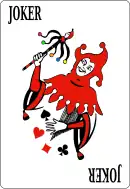jolly
English
Etymology
From Middle English joli, jolif (“merry, cheerful”), from Old French joli, jolif (“merry, joyful”)[1] It is uncertain whether the Old French word is from Old Norse jól ("a midwinter feast, Yule", hence "fest-ive") [2], in which case, equivalent to yule + -ive, compare Dutch jolig (“happy, festive, frolicsome, jolly”), West Frisian joelich, joalich (“merry, jolly”), Middle High German jœlich (“hooting, jubilant”); or ultimately from Latin gaudeō (see etymology at joy), which fails to explain the presence of l in jolif. For the loss of final -f compare tardy, hasty, hussy, etc.
Pronunciation
- (Received Pronunciation) IPA(key): /ˈd͡ʒɒli/
- (General American) IPA(key): /ˈd͡ʒɑli/
Audio (AU) (file) - Rhymes: -ɒli
- Hyphenation: jol‧ly
Adjective
jolly (comparative jollier, superlative jolliest)
- Full of merriment and high spirits; jovial; joyous; merry.
- 1590, Edmund Spenser, “Book I, Canto II”, in The Faerie Queene. […], London: […] [John Wolfe] for William Ponsonbie, →OCLC, , stanzas xi-xii:
- "Full jolly Knight he seemed […] full large of limb and every joint / He was, and cared not for God or man a point."
- 1815, William Wordsworth, Hart-Leap Well, Part Second:
- "A jolly place," said he, "in times of old! / But something ails it now: the spot is curst. ..."
- 1819, Washington Irving, “The Stage Coach”, in The Sketch Book of Geoffrey Crayon, Gent.:
- […] he is swelled into jolly dimensions by frequent potations of malt liquors […]
- (colloquial, dated) Splendid, excellent, pleasant.
- 1852 March – 1853 September, Charles Dickens, chapter 16, in Bleak House, London: Bradbury and Evans, […], published 1853, →OCLC:
- Jo silently notices how white and small her hand is and what a jolly servant she must be to wear such sparkling rings.
- (informal) drunk
Translations
Noun
jolly (plural jollies)
Derived terms
Adverb
jolly (comparative more jolly, superlative most jolly)
- (Britain, dated) very, extremely
- it’s jolly hot in here, isn’t it?
- 1991, Stephen Fry, chapter III, in The Liar, London: William Heinemann, →ISBN, page 26:
- Adrian thought it worth while to try out his new slang. ‘I say, you fellows, here's a rum go. Old Biffo was jolly odd this morning. He gave me a lot of pi-jaw about slacking and then invited me to tea. No rotting! He did really.’
Verb
jolly (third-person singular simple present jollies, present participle jollying, simple past and past participle jollied)
Derived terms
Translations
Italian
Pronunciation
- IPA(key): /ˈd͡ʒɔl.li/
- Rhymes: -ɔlli






